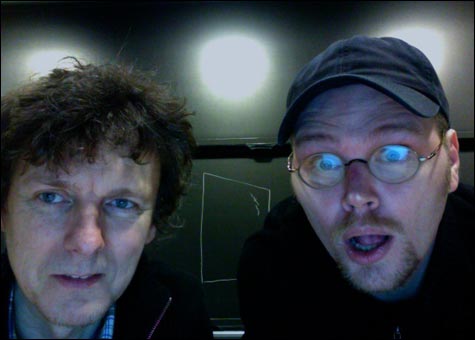
MICHEL, MICHEL: Gondry (left) and our interviewer |
Michel Gondry is not a household name. His films don’t make millions, but they’re easy to admire, appealingly rough around the edges, and not easily categorized –– just like the French director himself. Even if you’ve seen his biggest hit, 2004’s Eternal Sunshine of the Spotless Mind, you’re more likely to remember the stars — Jim Carrey and Kate Winslet — and the screenwriter, Charlie Kaufman. One of the year’s best films, it grossed less than $35 million in the US. If Gondry hasn’t achieved the visibility of Kaufman, who collaborated with him on his first two features (2001’s little-seen curio Human Nature is the other), that’s hardly surprising given his lack of ego-driven vanity. I spoke with him twice recently: first in Beverly Hills at the Four Seasons Hotel, and then a few weeks later, prior to a special screening of his new Be Kind Rewind for students at MIT, where he was an artist-in-residence during 2005 and 2006. The sustained applause following the MIT screening brought a sheepish smile to his face.I notice some similar themes in both this film and another of your pictures, Block Party, which Mos Def also appeared in. Did you have Mos and Jack Black in mind when you wrote the script for be kind rewind?
No, not in the beginning. I sort of had an intuition. Casting is important to me, especially because I had worked with Dave Chappelle on Block Party. That movie was about celebrating something I didn’t belong to and didn’t really understand, so that I got sort of sucked into it, and then I got addicted. Then when I started to write Be Kind Rewind, I had that in mind. I wanted really to talk about different communities coming together. My favorite band when I was a kid was Booker T. and the MG’s, who were one of the very few integrated bands –– in Memphis, in the ’60s! At the time, there were two white people in the band, and depending on the state or city where they would be, two would stay in the car and two would go out shopping. It’s interesting –– they were best friends. I actually played with them for this soundtrack, which was my dream come true. I played the drums with them!

Jack Black is quite obnoxious in this film, but he’s able to balance a certain sweetness with being funny. Is this what led you to cast him?
I think it’s his commitment to do what he has to do in the most professional way. I like this moment when Mos tells him, “No, no, we can’t do the take again,” and he’s really sort of heartbroken, because he wants to do really good. And I really like this quality in his character. He brings that, of course. He’s naive, he’s clumsy, he’s grotesque at times, but he really tries very hard at what he does. He’s very natural, and very extreme at the same time. He’s naked when he’s dressed for some reason, or dressed when he’s naked.
And Mos Def?
Well, I think he’s a very deep actor. As you pointed out, I worked with him when I did Block Party with Dave Chappelle, and he was easily the most charismatic actor . . . equally with Dave, but he’s more of an actor, inside. He has this quality — just by looking at him, you feel something going on deep inside him. And he’s a lower-energy character than Jack, with more inside, so it was a very good pair.
They play small characters who come into their own, the catalysts for bringing the community together to tell their story, even if that story is based on fiction.
Yes, exactly. We underestimate ourselves. I had a French teacher when I was in seventh grade. She told us at the beginning of the year that our story is as interesting as anybody else’s. She was trying to unlock our fear or embarrassment to tell our stories, and I think that’s a very good point that I took in and I always remember and I try to express that in this film.
Isn’t it a bit anachronistic that people are still watching movies on VHS in your film?
Well, I know that my mother could not work a DVD player, and I’ll tell you exactly why. It’s very simple: with a DVD, when you press “PLAY,” you’re not pressing “PLAY,” you’re asking the system if it wants to play! You have to wait for it to say, “Yeah, okay, I’m going to play your DVD,” but with video, you press an actual button and get your immediate order. I can see why my mother wouldn’t like it. Sometimes, when your DVDs get scratched, you’d be happy to have VHS, because VHS, even when as bad as possible, you can always get the information out.